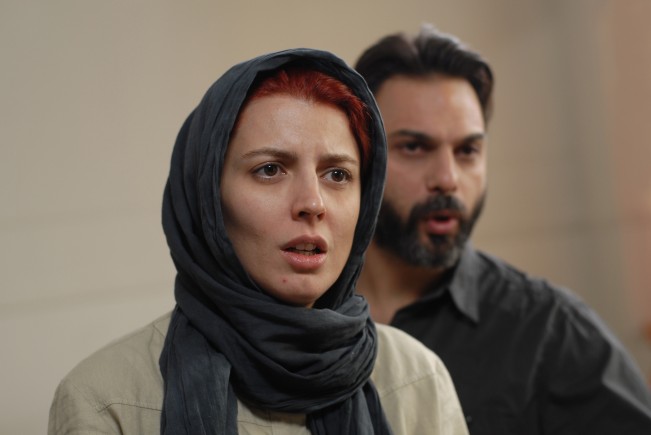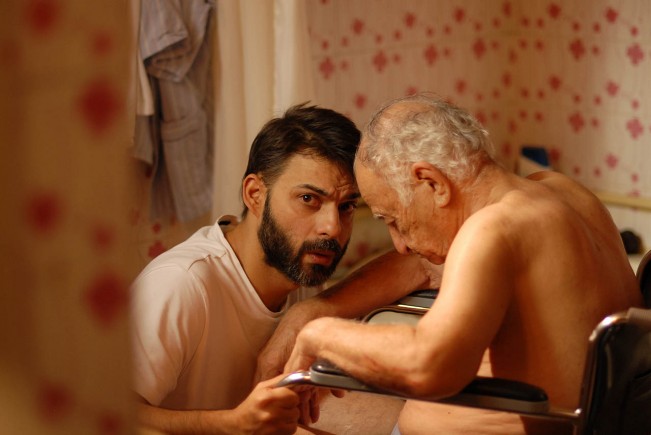The Gronvall Files
Family Ties: An Interview with double-Oscar nominee Asghar Farhadi
A Separation, the gripping fifth feature by Iranian filmmaker Asghar Farhadi, has been on a roll since last year’s film festival circuit, when it won Berlin’s top prize, the Golden Bear. Earlier this month it picked up a Best Foreign Language Film Golden Globe, and now it has been nominated for two Academy Awards: Best Original Screenplay and Best Foreign Language Film.
A few years ago I reviewed one of the director’s previous films, Fireworks Wednesday, but as much as I admired that movie, it didn’t prepare me for the wallop A Separation packs. The movie begins in a Tehran divorce court, where Simin (the luminous Leila Hatami), yearning to pursue a new life abroad with her young daughter (Sarina Farhadi, a heart-tugging performer), seeks release from her dour husband Nader (the superb Peyman Moadi), who will not abandon his Alzheimer’s-afflicted father. Simin moves in with her parents, and Nader, in order to function in his job as a banker, is forced to hire an outsider to look after dad. The new, unskilled caretaker Hodjat ( Shahab Hosseini) harbors many fears, the biggest being what would happen if her hot-tempered, unemployed husband finds out that she took this job.
Before long, the desperate caretaker makes a horrific miscalculation when she leaves her charge tied to a bedpost; the furious Nader then compounds the tragedy. Immediately two families are embroiled in a struggle that cuts to the heart of social strife, while the viewer tries to discover which character is telling the truth, and which is lying. Recently the director, a film school graduate who also labored in theatre, radio, and television, stopped briefly in Chicago, where we conversed with the aid of his quick-witted Italian-Iranian translator.
Andrea Gronvall: A Separation is a domestic drama, at least at first. Then it evolves into tragedy. As in many tragedies, the main characters are essentially good, well-intentioned people. But as in ancient Greek tragedies, here they each have a flaw that leads to downfall. In your work in the theatre, was tragedy one of your preferred modes?
Asghar Farhadi: When I was working in theatre I was reading a lot of tragedies. But this kind of tragedy—if you want to compare it to the classic tragedies of the past—has one historic difference. In a classic tragedy, there is a war between good and evil, but in modern tragedies, the war is between good and good. In classic tragedies, you hope the bad guy dies, so you feel better. But in this modern tragedy, you don’t know which character you want to win, which one you want to lose, and you’re probably not going to feel good about either.
There’s also another difference between the classic tragedy and the modern tragedy. The weakness–the Achilles heel–of the classic tragic hero comes from within himself. For example, Hamlet doubts too much. King Lear is not very with it. Macbeth is too hungry for power. But for the characters of the modern tragedy, their weaknesses don’t come from within themselves; they come from the environment, the pressure that the environment puts on them.
AG: You work very fast: it was ten months between when you started writing this screenplay, until the end of—or was it the start of–post-production?
AF: Towards the middle of post-production. This time it was fast. But you started counting from the very moment I put my pen on the paper; this was brewing within me for a long time before. Not specifically this story, but just a combination of images, and feelings, and thoughts.
AG: So you start with the images. Then, when you sit down to write, do you have in mind the beats–you know, those points in the characters’ arcs that are going to get you from A to Z? Or does it all begin with one particular character, and then branches out to incorporate other characters?
AF: When I have an image in mind, this image makes me keep returning to my past. I go into my memories, and I start selecting here and there, putting them together. Simultaneously with this process of assembling memories, the characters are being born. And at the same time, the story also starts developing. It’s very difficult for me to describe my process. I’m not really aware of what’s going on, really, as I’m thinking. Many things happen in an unconscious way.
AG: You’re in the flow of it.
AF: Yes, like a river.
AG: Memories: that brings me to my next point. Alzheimer’s disease is key to narrative developments in A Separation, but I didn’t know that going in to screen your film. Generally, I try to read as little as possible about a film before I see it, in order that my perceptions of the movie aren’t filtered through someone else’s take.
AF: This is the best way to watch a film.
AG: So, as I was watching your film, I was profoundly struck by its accuracy and emotional honesty, by how well you captured what it’s like to have a parent who has Alzheimer’s, what the pressures are on a professional with a demanding job who’s also trying to do the right thing by his father, and what are often the differences in class between the professional and the caretaker he hires to look after the parent. After I saw the film, I read that your grandfather had Alzheimer’s. If it’s not too personal, could you please tell me how your parents coped? How did you cope? How old were you when you witnessed your grandfather in decline?
AF: I have to go back a little [in time] for my description. When I was little, I didn’t love anybody like I loved my grandfather. He was my hero. He was very loved and revered, by everybody. He was always telling me a lot of stories. And I believe that the reason why I became a writer and a filmmaker is thanks to all those stories.
Then I had to move from the city where he was living to attend university in another city; for years I lived in this new city, and of course I saw him much less. I think that I was around 30 when I realized that he had become ill. When I would go visit him, of course he had the same frame, and yet he didn’t remember anything anymore, and he turned from that big hero he was to me into a much smaller person.
From the person who had had this incredible memory, who could tell me stories of all kinds and always surprise me with the endings, I now had a man in front of me who couldn’t even remember my name. This is a very painful disease. Before, I always thought that when people miss or lose their future, that’s very painful. But I also realize now that when people lose their past, that’s even more painful.
My grandfather had a few relatives who never allowed him to be taken to a home; they decided that they would take care of him. Every day one of his children was there. And then one day it happened that none of the kids could take care of him, so they hired a nurse, and this nurse tied him to the bed. A few days after this occurred he actually died. I had not thought about this for a while, but this came back to me.
AG: Your daughter Sarina Farhadi is lovely, and a very affecting actress. Is this her first film?
AF: No, you saw her in Fireworks Wednesday [playing] the child, the daughter.
AG: How old was she then?
AF: Then, she was four.
AG: She’s grown up!
AF: This is the fourth film she’s in, but it’s also the biggest role she’s ever played.
AG: Does she stand in for you, in a way, in A Separation? Does she portray aspects of your childhood?
AF: No, my childhood was very different from the characterization in this film. When I was a child I was very noisy; I was not calm. [Laughing.]
AG: Well, I can understand the attraction to the theatre, then. Fireworks Wednesday is also about deception and class conflicts. What keeps attracting you to these themes?
AF: This fight between two different classes is not just at the level of economics. This is the conflict between a middle class that has more knowledge and is more directed towards modernity, and a lower class that is tied to the past and to traditions. It’s almost a conflict between new and old. In Fireworks Wednesday, that’s not the main theme, but here in A Separation, it is.
AG: Well, you’re in very good hands with Sony Pictures Classics. When did your paths first cross?
AF: It was in Berlin. Yes, and they actually love film. I think that Michael Barker loves the movie even more than I do.
AG: Do you have any feelings at all about the possibility of winning an Oscar?
AF: I try not to think about it.











